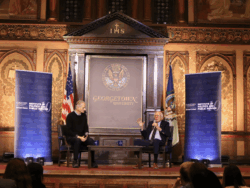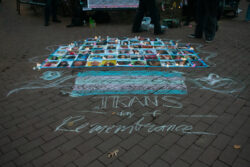Given Georgetown’s claim to housing the nation’s premier Arab studies program, the rising prominence of the Program for Jewish Civilization, and the highly politicized atmosphere of Washington, D.C., it’s no surprise that the conflict in Gaza has provoked a great deal of interest on campus.
As the crisis escalated, Georgetown students and faculty responded to the events though editorials, heated discussion, activism, and public meetings.
A group of professors calling themselves “The Georgetown Faculty for Gaza” organized an event on January 22 that included professors and activists from across the Washington area. The event featured four speakers who highlighted different aspects of the conflict, covering everything from the legal ramifications of the conflict to the humanitarian situation in Gaza.
“We feel that Georgetown is a leading institution in the study of the Arab and Muslim world with one of the largest concentrations of faculty,” Ahmad Dallal, Chair of the Arabic Department, said. “Our students come from all political walks, and we train them, and they take up positions everywhere in the various government agencies and administrations. We are invested intellectually in addition to being invested morally in the Middle East. Therefore we feel the need to say something when events on this scale happen.”
According to Dallal, a group of students tried to disrupt the event. They were eventually escorted out of McNeir Auditorium.
Eytain Shain (SFS `11), an Israeli student who attended the lecture, said that the individuals who disrupted the event were not Georgetown students. Shain was bothered by some of the statements expressed at the Georgetown Faculty for Gaza event.
“There was a lot of unnecessary anti-Semitic and anti-Israeli sentiment expressed by the speakers,” Shain said. “I thought the agenda of the lecture did not promote dialogue among the students. It was mainly to criticize and shift blame onto Israelis and bring facts to the table which are not true.”
Michael Oren, a visiting professor in the School of Foreign Service and a spokesman for the Israel Defense Force, delivered an impassioned address to students and faculty Wednesday night. Entitled, “The Gaza Crisis from a Historical and Personal Perspective,” Oren described his extensive service in the Israeli Defense Force and the “existential” threats facing the state of Israel.
In a phone interview, Oren characterized the conflict as a victory for Israel and described the dialogue at Georgetown in a positive fashion.
“I think [the Georgetown community’s response] is as fair as any university that I have taught at,” Oren said when asked about the possibility of anti-Israeli bias.
The night before Oren’s lecture, an event was held to commemorate the life of Palestinian poet Mahmoud Darwish. Described by the keynote speaker as a poet who “spoke for his people,” the event concluded with poetry readings in Arabic and English that described the plight of the Palestinian people.
Another event scheduled for Tuesday was a lecture series entitled “Obama’s Challenges in the Muslim World,” co-sponsored by the Prince Alwaleed Bin Talal Center for Muslim-Christian Understanding, the Institute for the Study of Diplomacy, the Center for Peace and Security Studies, and the Center for Contemporary Arab Studies. The event was cancelled due to inclement weather.
Dallal, John Esposito, Director of the Prince Alwaleed Bin-Talal Center for Muslim-Christian Understanding, and Louis Seidman, a professor at the Law Center, wrote an editorial entitled “Indicting Israel in the Wake of War” which appeared in the Hoya on January 23. Speaking on behalf of the Georgetown Faculty for Gaza, the authors characterized the conflict as a “massacre of Palestinian civilians” and called for “investigations into the reported cases of Israeli war crimes.” According to Dallal, a private letter with a similar message was sent to President Obama with signatures from over 50 Georgetown faculty members.
Professor Robert Lieber of the Government Department characterized the editorial as “extremely one-sided and polemical.”
“You would never know from the article that Israel had been hit with 3,500 rockets and mortars since it withdrew from Gaza,” Lieber said. “How can you talk about the conflict without including that?”
In an interview, Lieber took a strong stance condemning the actions of Hamas in the Gaza strip and defending Israel’s right to security. He also chose not to describe his position as “pro-Israel,” but instead called his views “mainstream” and consistent with the American public and U.S. foreign policy. Lieber contributed to the public debate over the conflict in Gaza with an editorial in the Washington Post on January 1.
In contrast, Dallal focused on the humanitarian crisis in Gaza and strongly condemned Israel’s actions in the region.
“All the [Hamas] rockets together have the destructive power of one load of an F-16,” Dallal said. “Nothing justifies killing on this scale.”
Visiting Israeli Professor Avi Beker countered with a sobering assessment of Israel’s unique position, georgraphically surrounded by non-democratic Arab states and facing groups like Hamas who seek the destruction of Jewish state.
In general, most professors and students believed that a wide range of perspectives received a fair hearing at Georgetown.
“There’s been an understating and coming to grips with the empirical reality and also the moral dimension of the conflict,” Michael Hudson, Director of the Center for Contemporary Arab Studies, said. “I believe that Georgetown is pretty good in this sense with students who are out there engaged in the issues.”





[…] Faculty for Gaza,” which essentially voiced a preference for Hamas against Israel. He wrote in support of the jihadi group: “All the [Hamas] rockets together have the destructive power […]